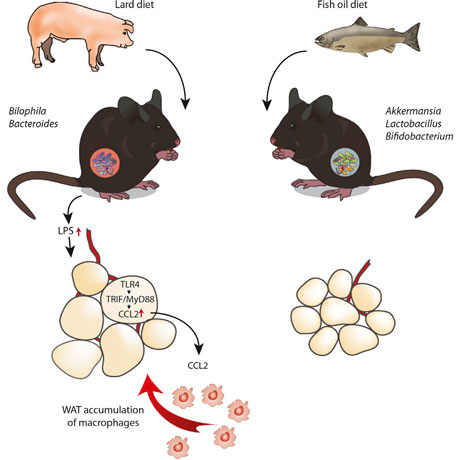Fish Oil-Diet Benefits May be Mediated by Gut Microbes

Fish Oil-Diet Benefits May be Mediated by Gut Microbes University of Gothenburg
In particular, mice that received transplants of gut microbes associated with a fish oil diet were protected against diet-induced weight gain and inflammation compared with mice transplanted with gut microbes associated with a lard diet. This demonstrates that gut microbes are an independent factor aggravating inflammation associated with diet-induced obesity and gives hope that a probiotic might help counteract a “greasy” diet.
Interventions for optimizing health
“We wanted to determine whether gut microbes directly contribute to the metabolic differences associated with diets rich in healthy and unhealthy fats,” says first study author Robert Caesar of the University of Gothenburg. Even though the study was done in mice, “our goal is to identify interventions for optimizing metabolic health in humans.”
Monitoring the metabolics
Caesar, working in the lab of senior study author Fredrik Bäckhed, began by feeding either lard or fish oil to mice for 11 weeks and monitoring signs of metabolic health.
While the consumption of lard promoted the growth of bacteria called Bilophila, which have been linked to gut inflammation, the fish oil diet increased the abundance of bacteria called Akkermansia muciniphila, known to reduce weight gain and improve glucose metabolism in mice.
“We were surprised that the lard and the fish oil diet, despite having the same energy content and the same amount of dietary fiber–which is the primary energy source for the gut bacteria–resulted in fundamentally different gut microbiota communities and that the microbiota per se had such large effects on health,” says Fredrik Bäckhed.
Additional evidence
In the next set of experiments, the researchers conducted “fecal transplants” to test whether fish oil-diet microbes could improve the health of mice fed only lard and vice versa. The results provide additional evidence that gut microbe communities can both determine and recover health problems caused by poor diet.
“Our paper supports previous reports indicating the bacteria Akkermansia muciniphila is a promoter of a healthy phenotype,” Bäckhed says. “However, further investigations will be needed to determine if this bacteria can be used as probiotic strain and, in that case, how it should be combined with diet to optimize health outcomes.”
The paper “Crosstalk between Gut Microbiota and Dietary Lipids Aggravates WAT Inflammation through TLR Signaling” was published in Cell Metabolism 27 August.
Link to journal: http://www.cell.com/cell-metabolism/home
For more information please contact:
Fredrik Bäckhed, Professor at Sahlgrenska Academy, University of Gothenburg
Fredrik.Backhed@wlab.gu.se
+46 (0)31-342 7833
+46 (0)70-2182355
Robert Caesar, researcher at the Sahlgrenska Academy, University of Gothenburg
Robert.Caesar@wlab.gu.se
Phone: +46 (0)31-342 8672
http://www.gu.se/english/about_the_university/news-calendar/News_detail//fish-oi…
Media Contact
All latest news from the category: Life Sciences and Chemistry
Articles and reports from the Life Sciences and chemistry area deal with applied and basic research into modern biology, chemistry and human medicine.
Valuable information can be found on a range of life sciences fields including bacteriology, biochemistry, bionics, bioinformatics, biophysics, biotechnology, genetics, geobotany, human biology, marine biology, microbiology, molecular biology, cellular biology, zoology, bioinorganic chemistry, microchemistry and environmental chemistry.
Newest articles

First-of-its-kind study uses remote sensing to monitor plastic debris in rivers and lakes
Remote sensing creates a cost-effective solution to monitoring plastic pollution. A first-of-its-kind study from researchers at the University of Minnesota Twin Cities shows how remote sensing can help monitor and…

Laser-based artificial neuron mimics nerve cell functions at lightning speed
With a processing speed a billion times faster than nature, chip-based laser neuron could help advance AI tasks such as pattern recognition and sequence prediction. Researchers have developed a laser-based…

Optimising the processing of plastic waste
Just one look in the yellow bin reveals a colourful jumble of different types of plastic. However, the purer and more uniform plastic waste is, the easier it is to…



